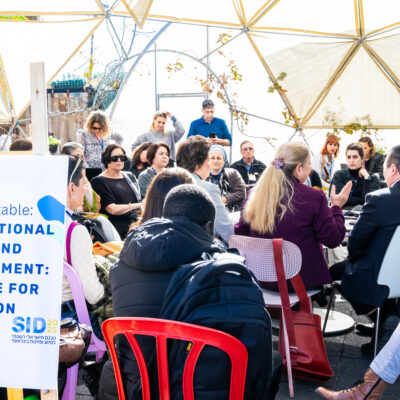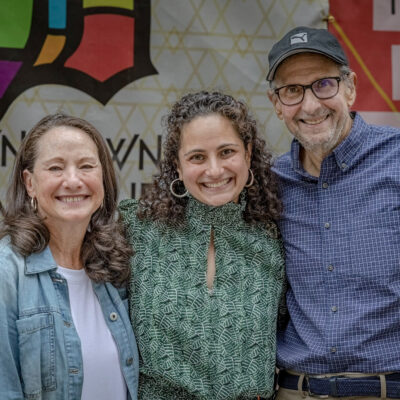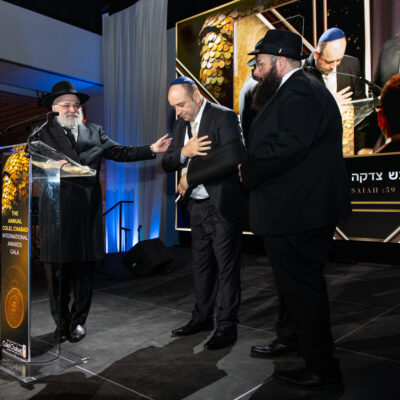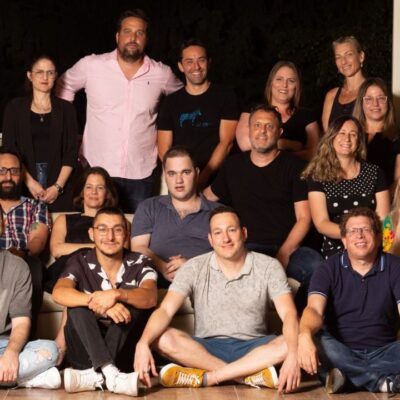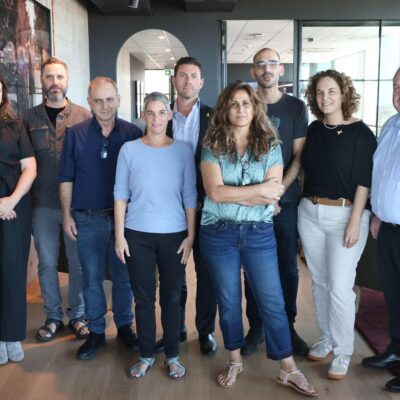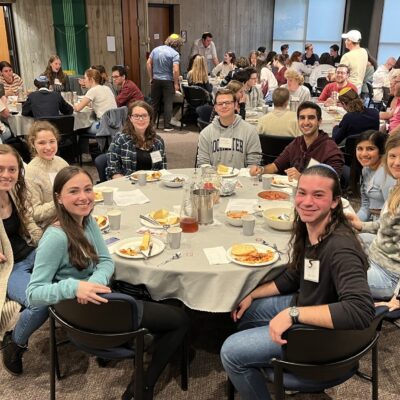HELP WANTED
Close enough to have to flee, but not to get help: Gaza border towns rely on donations for housing after attacks
For now, the Israeli government has only officially approved evacuations of communities within 2.5 miles of Gaza, leaving those just on the other side of that line having to fend for themselves

GIL COHEN-MAGEN / AFP via Getty Images
Residents of the southern Israeli town of Netivot near the Gaza Strip wait next to a bus before being evacuated to central Israel on Oct. 7, 2023.
Moshav Tkuma is too close to the Gaza border to have sirens to warn residents of impending mortar or rocket fire. Instead, loudspeakers blare the message “Tzeva Adom” (Code Red) in real time, but they weren’t really needed on Saturday morning.
“We just started hearing explosions in the air,” Eliran Cohen, a resident of the community, told eJewishPhilanthropy. “We woke up the kids and went downstairs to our basement, which is all a bomb shelter.”
Cohen said he began receiving nonstop telephone calls — a rare thing to happen on Shabbat in a religious community like Tkuma — which first alerted him that this was not just another rocket attack. “I got a call from a family member who’s a security officer and I understood that this was an irregular event and… that we needed to barricade ourselves in the bomb shelter.”
Cohen’s family hid inside the bomb shelter from the initial attacks shortly before 7 a.m. until almost 10 p.m., and he would occasionally run upstairs to get news of what was going on. Terrorists never got to Tkuma, but they got extremely close. Dozens of Hamas terrorists infiltrated the neighboring Kibbutz Alumim, murdering dozens of foreign workers and several residents before the community’s first response team killed them.
“I kept trying to understand, how close is this to my doorstep? The closest was 400 meters [435 yards] from our door, not from the boundary of our community, from our doorstep,” Cohen said.
Once Cohen’s family received the all-clear that they could leave, they threw three hastily packed suitcases in the car and drove north, not knowing exactly where they were headed.
Since Saturday, the family has slept in four different places: A vacant apartment that someone let them use; a hotel room they paid for; a holiday home offered for free; and now the Kinar Hotel on the Sea of Galilee coast, which is being paid for privately.
Following Saturday’s terror attacks, the Israeli government ordered the evacuation of all communities within 2.5 miles of the Gaza border. (Though there was an understanding immediately that the government would pay for the evacuation, it took until Wednesday night for it to be officially approved.) In doing so, the residents of those communities — almost all of which were infiltrated by Hamas terrorists and suffered tremendous losses — were guaranteed government assistance, being provided with housing until they could return to their homes.
But the communities located just beyond that line, including Tkuma, which is located roughly four miles from the border, have been left to their own devices, receiving no official government support.
This is true not only of Tkuma and the smaller communities in the so-called “Gaza envelope,” but also the larger town of Sderot, which experienced a terrorist infiltration that lasted almost a full 24 hours. Residents of Sderot are also being forced to find offers of assistance or pay for their own hotel rooms, though this may change soon.
In the first few days, Cohen said he was focused solely on ensuring that his family’s basic needs were met, but now that he knows that his family has a place to stay for at least a few more days, he is working to try to find solutions for his neighbors as well.
“We don’t have a solution for our community for our basic needs yet,” he said. “We just have makeshift solutions.”
Cohen said he is doing so because he is “privileged” in that he works for Taglit-Birthright as the vice president of operations and business development at Onward Israel, which gives him access to the organizations and funders that can potentially help his community. He said his past work in Israel-Diaspora relations has also made him understand that maintaining a “strategic relationship” with American Jewry was critical at times of crisis like this.
Cohen stressed that the communities closest to the border who were directly attacked and suffered unimaginable losses should of course be the priority for the government and nonprofits. Yet he lamented that his community was “falling through the cracks,” having been displaced by the ongoing war, just not by official government decree.
He said there was a feeling among some residents that “[the government] abandoned us once and now they’re abandoning us again.”
Amid this uncertainty about where they will spend the night, many residents of Cohen’s town have been called up for reserve duty — in some cases, both parents have been called up — putting further stress on the families.
Tkuma, a farming town home to 186 families, lies just outside of the town of Netivot and is part of the Sdot Negev region, which has a partnership with the city of Philadelphia and its Jewish federation. The Jewish Federation of Greater Philadelphia’s representative in Israel, Tali Lidar, said the federation was working to provide direct aid to the Sdot Negev communities.
“I’ve transferred several hundreds of thousands of dollars, and there’s more on the way,” she said.
The Jewish National Fund-Keren Kayemet Le’Yisrael has also provided Sdot Negev with NIS 1 million ($251,000).
However, these funds are not specifically allocated toward providing temporary housing for the residents. While some may go to that purpose, much of it will likely go to other causes.
Cohen has therefore worked with the Jewish Federation of Greater Philadelphia to allow funders to donate directly to communities, specifically for their housing and basic necessities. While he is focused specifically on raising money for his community of Tkuma, any of the the towns in the Sdot Negev region can receive donations through the federation, he said. He is also working with other communities in order to determine what is needed.
Lidar said she was also working with a number of other federations to try to get funding specifically for housing. Lidar said that donations from North America to the Sdot Negev communities should be directed through the federation and the regional council in order to ensure that there are no redundancies. “The last thing we need is a donor from Toronto to give money for equipment for first-response teams, which is something that we have already covered,” she said.
Cohen asked that anyone looking to contribute to this effort should contact him directly at Elirancoh@gmail.com or contact Lidar at Tlidar@jewishphilly.org.

 Add EJP on Google
Add EJP on Google





